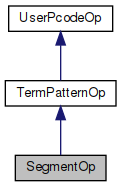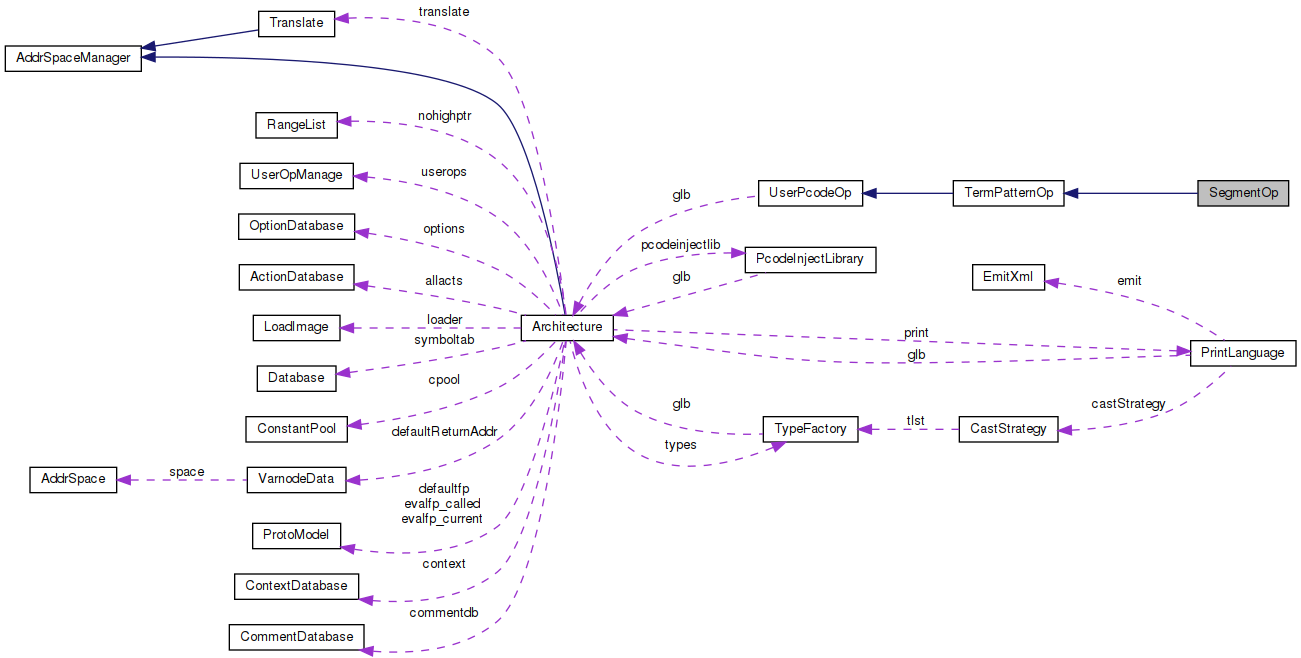The segmented address operator. More...
#include <userop.hh>


Public Member Functions | |
| SegmentOp (Architecture *g, const string &nm, int4 ind) | |
| Constructor. More... | |
| AddrSpace * | getSpace (void) const |
| Get the address space being pointed to. | |
| bool | hasFarPointerSupport (void) const |
| Return true, if this op supports far pointers. | |
| int4 | getBaseSize (void) const |
| Get size in bytes of the base/segment value. | |
| int4 | getInnerSize (void) const |
| Get size in bytes of the near value. | |
| const VarnodeData & | getResolve (void) const |
| Get the default register for resolving indirect segments. | |
| virtual int4 | getNumVariableTerms (void) const |
| Get the number of input Varnodes expected. | |
| virtual bool | unify (Funcdata &data, PcodeOp *op, vector< Varnode *> &bindlist) const |
| Gather the formal input Varnode objects given the root PcodeOp. More... | |
| virtual uintb | execute (const vector< uintb > &input) const |
| Compute the output value of this operation, given constant inputs. More... | |
| virtual void | restoreXml (const Element *el) |
| Restore the detailed description from an XML stream. More... | |
 Public Member Functions inherited from TermPatternOp Public Member Functions inherited from TermPatternOp | |
| TermPatternOp (Architecture *g, const string &nm, int4 ind) | |
| Constructor. | |
 Public Member Functions inherited from UserPcodeOp Public Member Functions inherited from UserPcodeOp | |
| UserPcodeOp (Architecture *g, const string &nm, int4 ind) | |
| Construct from name and index. | |
| const string & | getName (void) const |
| Get the low-level name of the p-code op. | |
| int4 | getIndex (void) const |
| Get the constant id of the op. | |
| virtual | ~UserPcodeOp (void) |
| Destructor. | |
| virtual string | getOperatorName (const PcodeOp *op) const |
| Get the symbol representing this operation in decompiled code. More... | |
Additional Inherited Members | |
 Protected Attributes inherited from UserPcodeOp Protected Attributes inherited from UserPcodeOp | |
| string | name |
| Low-level name of p-code operator. | |
| int4 | useropindex |
| Index passed in the CALLOTHER op. | |
| Architecture * | glb |
| Architecture owning the user defined op. | |
Detailed Description
The segmented address operator.
This op is a placeholder for address mappings involving segments. The map goes between a high-level view of a pointer, consisting of multiple pieces, and a low-level view, where there is only a single absolute pointer. The mapping could be
- a virtual to physical mapping for instance or
- a segment + near pointer to a full address
The output of the operator is always a full low-level pointer. The operator takes two inputs:
- the base or segment and
- the high-level near pointer
High-level analysis can ignore the base/segment and any normalization on the near pointer. Emitted expressions involving this segment op prints only the near portion. Data-type information propagates only through this high-level side.
The decompiler looks for the term-tree defined in SegmentOp and replaces it with the SEGMENTOP operator in any p-code it analyzes. The core routine that looks for the term-tree is unify().
Constructor & Destructor Documentation
◆ SegmentOp()
| SegmentOp::SegmentOp | ( | Architecture * | g, |
| const string & | nm, | ||
| int4 | ind | ||
| ) |
- Parameters
-
g is the owning Architecture for this instance of the segment operation nm is the low-level name of the segment operation ind is the constant id identifying the specific CALLOTHER variant
Member Function Documentation
◆ execute()
|
virtual |
Compute the output value of this operation, given constant inputs.
- Parameters
-
input is the ordered list of constant inputs
- Returns
- the resulting value as a constant
Implements TermPatternOp.
◆ restoreXml()
|
virtual |
Restore the detailed description from an XML stream.
The details of how a user defined operation behaves can be dynamically configured from an XML tag.
- Parameters
-
el is the root XML element describing the op
Implements UserPcodeOp.
◆ unify()
|
virtual |
Gather the formal input Varnode objects given the root PcodeOp.
- Parameters
-
data is the function being analyzed op is the root operation bindlist will hold the ordered list of input Varnodes
- Returns
- true if the requisite inputs were found
Implements TermPatternOp.
The documentation for this class was generated from the following files:
- userop.hh
- userop.cc
 1.8.13
1.8.13